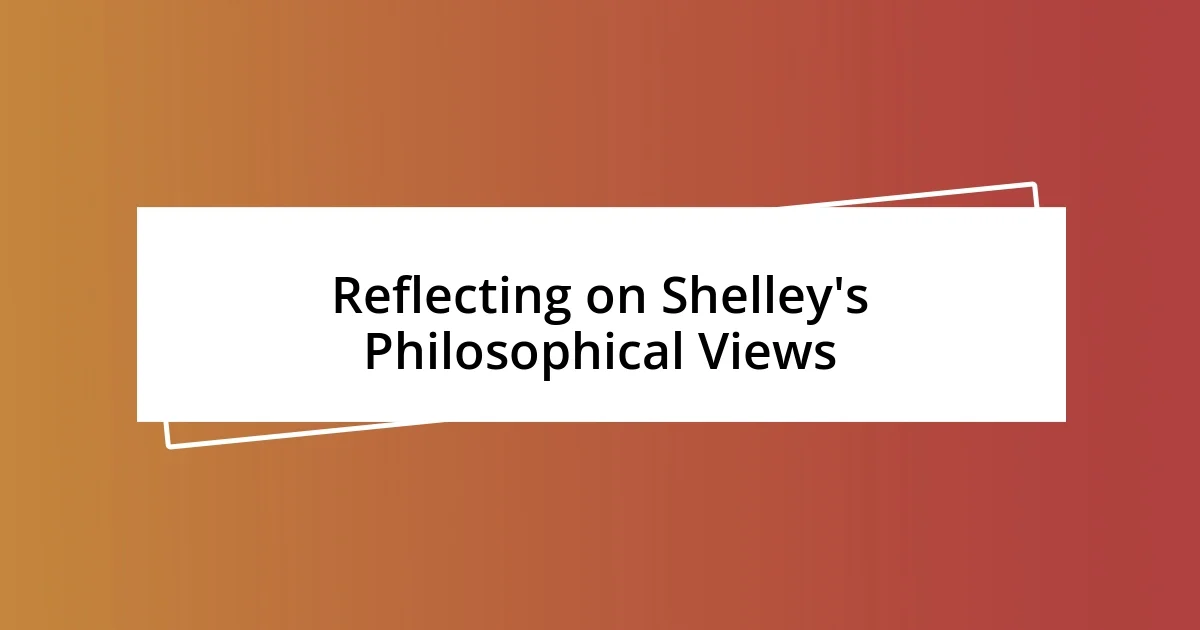Key takeaways:
- Shelley’s exploration of human emotion and social reform inspires a reflection on personal experiences with transformation, empathy, and the importance of voice against injustice.
- Key themes in Shelley’s work, such as the interplay of nature, the experiences of misunderstood individuals, and the duality of love and loss, resonate deeply, highlighting emotional depth in human experiences.
- Applying Shelley’s lessons today emphasizes the significance of personal expression, questioning societal norms, and recognizing our interconnectedness with nature, fostering authenticity and responsibility.

Understanding Shelley’s Influence
Shelley’s influence is deeply rooted in his exploration of human emotion and revolutionary thought. I remember the first time I encountered “Ode to the West Wind”; the sheer power in his imagery resonated within me. How often do we grapple with the forces of change in our own lives? Shelley captures that tumult beautifully, pushing me to reflect on my own experiences with transformation and renewal.
As I delved deeper into his writings, I began to appreciate his profound sense of empathy. There’s a moment in “Prometheus Unbound” where he questions the nature of oppression and liberation. This made me think about the struggles individuals face daily. Have you felt compelled to act against injustice in your own surroundings? Shelley’s passion for social reform ignites a spark in me, reminding us that our voices matter.
In contemplating Shelley, I find myself drawn to his belief in the potential for beauty and truth amidst despair. His ability to weave hope into moments of darkness resonates with my own life experiences. Isn’t it fascinating how a poet from the past can inspire reflection on our present challenges? Through Shelley’s lens, I’ve learned that amidst our struggles, there lies an opportunity for growth and understanding.

Key Themes in Shelley’s Work
Shelley’s work is often marked by themes of nature and the sublime, which I find deeply inspiring. When I first read “Mont Blanc,” I was struck by how he personifies the mountain, intertwining his feelings with the natural world. It made me reflect on my own experiences in nature—how awe-inspiring moments can ground us and reveal deeper truths about ourselves.
Another recurrent theme in Shelley’s poetry is the concept of the outcast or the misunderstood individual. In “Adonais,” he laments the loss of John Keats, but it serves as a broader commentary on the fate of artists and thinkers who often face isolation. There was a time in my life when I felt out of place in a world that didn’t seem to understand my passions. Shelley’s exploration of this theme resonates with me—it’s a reminder that feeling like an outsider can be a catalyst for creativity and profound insights.
Finally, I cannot overlook the intense relationship between love and loss that permeates Shelley’s work. The sorrowful beauty of “Love’s Philosophy” captures the longing for connection that I think many can relate to. Reflecting on my own relationships, I’ve learned that love and loss are intertwined threads in the fabric of our lives. Shelley’s ability to articulate this duality encourages me to embrace my emotional journey, recognizing that both joy and sorrow shape who we are as individuals.
| Key Themes | Explanation |
|---|---|
| Nature and the Sublime | Exploration of nature’s beauty and its connection to human emotion. |
| The Outcast | Focus on the struggles of misunderstood individuals, often reflecting the artist’s journey. |
| Love and Loss | Interrelation of love and sorrow, highlighting emotional depth in human experiences. |

Personal Resonance with Shelley’s Ideas
My connection with Shelley deepens when I consider his thoughts on the transformative power of love. I recall a time when I was navigating a difficult breakup. In that moment of heartbreak, I found solace in reading “To a Skylark,” where he illustrates love as an uplifting force. It dawned on me that while love can bring pain, it also opens our hearts to beauty and growth. It’s a duality I came to embrace—understanding that every emotional upheaval carries the potential for personal evolution.
- Love often acts as a catalyst for introspection.
- Moments of heartache can prompt profound self-discovery.
- Shelley’s idealism about love helps me navigate my own emotional landscape.
Moreover, I resonate with his contemplations on individuality and freedom. I distinctly remember being part of a creative writing group where my unique voice felt stifled by conformity. Shelley’s works, especially “The Mask of Anarchy,” encouraged me to pursue authenticity despite societal pressures. This empowerment to express my true self stems from his revolutionary spirit, reminding me that true freedom lies in embracing one’s individuality, no matter the odds.

Analyzing Shelley’s Style and Techniques
Shelley’s distinctive use of vivid imagery and symbolism is something I find particularly striking. For instance, in “Ozymandias,” he crafts a powerful image of a decaying statue in the desert, which serves as a metaphor for the impermanence of power and human ambition. This resonated with me during a time when I faced the fleeting nature of success in my own life; it reminded me to appreciate the journey rather than just the accolades.
Another technique that stands out in Shelley’s work is his innovative use of meter and rhyme schemes. I remember being captivated by the lyrical quality of his verses, especially in “The Cloud,” where the variations in rhythm mimic the unpredictable nature of the sky. This playful manipulation of form inspired me to explore my own poetic voice, encouraging me to break free from rigid structures and embrace creativity in my writing.
Shelley’s philosophical musings also invite deep reflection. His exploration of revolutionary ideas, particularly in “The Revolt of Islam,” pushed me to question the societal norms around me. I often pondered how his vision of political freedom could apply to our lives today. Engaging with these thoughts has invigorated my own commitment to activism; Shelley’s words act as a reminder that literature can ignite change and inspire the fight for justice.

Reflecting on Shelley’s Philosophical Views
Reflecting on Shelley’s philosophical views often brings to mind my own quest for justice and human rights. I remember an enlightening discussion during a university seminar on “Prometheus Unbound,” where we dissected the notion of liberation from oppression. Shelley’s depiction of Prometheus as an emblem of defiance sparked a fire in me. It made me question, how often do we stifle our voices for the sake of comfort? This thought lingered with me post-seminar, driving me to actively engage in causes that resonate with those themes of freedom and resistance.
Another aspect of Shelley’s philosophy that deeply resonates with me is his belief in the potential of the individual to effect change. Reflecting on my time volunteering in underprivileged neighborhoods, I saw firsthand how one person’s passion could ignite a community’s hope. Shelley’s writings, especially his emphasis on the importance of idealism, served as a guiding light during that experience. His words reminded me that while collective action is vital, the courage of one individual can create ripples that lead to significant social change.
What truly captivates me is Shelley’s vision of a better world intertwined with emotional depth. I often recall losing myself in “Alastor,” where the protagonist’s search for an ideal beauty reflects my yearning for meaningful connections in my life. It raised questions about the nature of fulfillment—What truly makes us whole? Through Shelley’s exploration of these themes, I found clarity; the answer lies not just in external validation but in the intimate relationships we cultivate and the dreams we dare to pursue.

Applying Shelley’s Lessons Today
Applying insights from Shelley’s work to our contemporary lives can be transformative. I recall a moment when I was caught in the hustle of daily life, often neglecting my creative pursuits. Inspired by Shelley’s boldness in expressing emotions, I began to journal my thoughts and feelings. This practice not only gave me a voice but allowed me to process my experiences, echoing Shelley’s testament to the power of personal expression.
Another lesson I’ve embraced is Shelley’s insistence on questioning societal norms. I found myself in a heated debate with friends about the expectations placed on us by society. It was Shelley’s relentless search for truth that pushed me to challenge these boundaries. I remember thinking, “What if we crafted our own paths instead of following the meticulously laid out plans of others?” This shifting perspective has encouraged me to pursue passions that resonate deeply with my values, fostering a more authentic existence.
Lastly, Shelley’s profound belief in the interconnectedness of humanity and nature speaks volumes today. During a recent hiking trip, standing amidst towering trees, I felt a serene connection to the world around me. This experience mirrored Shelley’s reverence for nature, reminding me that we must respect and protect our environment. It led me to wonder, how can we be better stewards of our planet? The answer lies in embracing our role as caretakers, inspired by the beauty Shelley so vividly captured in his work.














